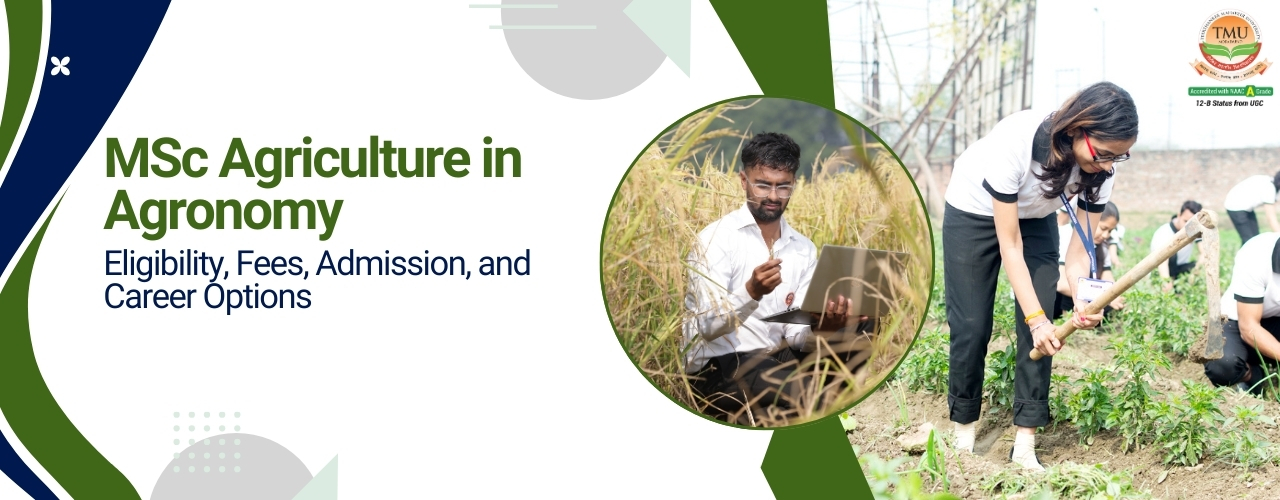MSc Agriculture in Agronomy: Eligibility, Fees, Admission, and Career Options
Table of Contents
MSc Agriculture in Agronomy is a two-year postgraduate course that focuses on crop production, soil management, irrigation, and sustainable farming. This programme helps students gain advanced knowledge of modern agriculture and prepares them for careers in both government and private sectors.
If you are interested in learning how to improve farming techniques and want to build a stable career in agriculture, an MSc in Agronomy can be a great choice.
Importance of Agronomy in Modern Agriculture
Agronomy isn’t just about growing crops; it’s about optimising every element of crop production—from soil preparation to seed selection, irrigation, and pest control. Today, with challenges like climate change, declining soil fertility, and increasing food demand, agronomy has become the heart of agricultural research and innovation.
An agronomist works like a doctor for the soil and crops. Just as doctors diagnose diseases in humans, agronomists analyse soil conditions, crop patterns, and environmental factors to prescribe the right practices for healthy and sustainable farming. Without proper agronomic practices, achieving high yields with minimal resources would be nearly impossible.
Teerthanker Mahaveer University
Apply for Admission
Click Here To Apply for Admission
Why Choose an MSc in Agriculture in Agronomy?
Pursuing an MSc in Agronomy is not just about getting a degree; it’s about becoming a problem-solver for farmers and agricultural industries. This program opens multiple career doors in teaching, research, government services, and private agribusiness firms. Students also develop critical thinking and practical skills, enabling them to contribute toward sustainable farming and food security at both local and global levels.
The MSc Agriculture in Agronomy is an ideal choice for individuals who are passionate about working close to nature, innovating in agriculture, and building a career that directly impacts society.
Course Overview of MSc Agriculture in Agronomy
Before diving into the details of admissions and fees, it’s important to understand what the course actually looks like.
| Aspect | Details |
| Course Name | MSc Agriculture in Agronomy |
| Level | Postgraduate (PG) |
| Duration | 2 Years (4 Semesters) |
| Eligibility | B.Sc. in Agriculture or related fields (Horticulture, Forestry, Agricultural Engineering) with 50–60% marks |
| Admission Process | Entrance Exams (ICAR AIEEA-PG, CUET-PG, State University Exams) / Merit-based |
| Mode of Study | Full-Time (Regular) |
| Core Subjects | Principles of Agronomy, Crop Production Techniques, Soil Fertility & Nutrition, Irrigation Management, Weed Management, Crop Physiology, Climate Change in Agriculture |
| Practical Training | Field Experiments, Soil & Water Analysis, Farm Visits, Use of Modern Machinery, Research Projects |
| Evaluation | Internal Assessments, Semester Exams, Practical Work, Dissertation/Thesis |
| Average Fees | ₹30,000 – ₹1,50,000 per year (varies by university) |
| Top Recruiters | ICAR, State Agriculture Departments, Seed & Fertilizer Companies, NGOs, Agri-Tech Startups, Research Institutes |
| Career Options | Agricultural Scientist, Crop Consultant, Farm Manager, Research Officer, Agribusiness Specialist, Lecturer/Professor |
| Average Salary | ₹4 – ₹8 LPA (can increase with experience and higher studies) |
Eligibility Criteria for MSc Agriculture in Agronomy
Getting admission to an MSc Agriculture (Agronomy) program requires meeting certain eligibility conditions.
Academic qualifications are required.
- A bachelor’s degree in agriculture or a related field, such as horticulture, forestry, or agricultural engineering, is mandatory.
- Most universities require a degree recognised by the ICAR (Indian Council of Agricultural Research) if you are studying in India.
Minimum Markings and Other Requirements
- Candidates must usually score 50–60% marks in their undergraduate programs.
- Some universities offer relaxation in marks for reserved categories as per government norms.
Age Limit and Relaxations
While most universities don’t have a strict upper age limit, some competitive exams may specify maximum age criteria for general and reserved categories.
Meeting these requirements ensures that students are academically prepared and eligible for advanced studies in agronomy.
Admission Process for MSc Agriculture in Agronomy
Admission into MSc Agriculture (Agronomy) can be competitive, depending on the university and the number of seats available.
Entrance Exams You Need to Clear
Some of the popular entrance exams include:
- ICAR AIEEA (All India Entrance Examination for Admission)
- State-level agricultural university entrance tests
- University-specific exams like BHU PET, PAU Entrance, etc.
Application Procedure Step-by-Step
- Check eligibility and entrance exam notifications.
- Register and fill out the application form online.
- Upload required documents such as transcripts, ID proof, and photographs.
- Pay the application fee.
- Appear for the entrance exam.
- Attend counselling or an interview if required.
Important Documents Required for Admission
- Bachelor’s degree certificate and mark sheets
- Entrance exam scorecard
- ID proof (Aadhar card, passport, etc.)
- Passport-size photographs
- Caste or category certificate (if applicable)
Completing these steps carefully ensures a smooth admission process.
Fee Structure and Scholarships
The cost of pursuing an MSc in Agriculture (Agronomy) varies depending on the institution.
Average Course Fees in Different Colleges
- Government universities: ₹20,000 – ₹70,000 for the entire course
- Private universities: ₹1,00,000 – ₹3,00,000 for the entire course
Government vs Private Institutions
Government institutions usually charge lower fees but may have fewer seats, making them more competitive. Private universities may charge higher costs, but they often provide modern infrastructure and industry connections.
Scholarships and financial assistance are available.
Students can apply for:
- ICAR scholarships
- State government scholarships
- College-specific fellowships
- Private or NGO-based financial aid programs
These scholarships can significantly reduce the financial burden and make the course more accessible.
Top Colleges and Universities Offering MSc Agriculture in Agronomy
When it comes to pursuing a specialised course like MSc Agriculture in Agronomy, choosing the right university is crucial. The reputation of the institution not only impacts your academic experience but also influences your career opportunities. Different colleges offer varied facilities, research exposure, and placement support.
| University/College | Location | Type | Highlights |
| Indian Agricultural Research Institute (IARI) | New Delhi | Government | The premier institute for agricultural research offers advanced research facilities in agronomy. |
| Punjab Agricultural University (PAU) | Ludhiana, Punjab | Government | Known for contributions to the wheat and rice revolution; strong placement record. |
| Banaras Hindu University (BHU) | Varanasi, Uttar Pradesh | Central University | Offers MSc Agronomy with a strong emphasis on research and field practices. |
| Tamil Nadu Agricultural University (TNAU) | Coimbatore, Tamil Nadu | Government | Recognised for innovations in crop production and soil management. |
| Acharya N.G. Ranga Agricultural University (ANGRAU) | Andhra Pradesh | Government | Field-oriented training and strong focus on agronomy research. |
| G.B. Pant University of Agriculture and Technology | Pantnagar, Uttarakhand | Government | One of India’s oldest agricultural universities, excellent reputation in agronomy. |
| Dr. Rajendra Prasad Central Agricultural University | Pusa, Bihar | Government | Historic institute with advanced research in soil and crop sciences. |
| Teerthanker Mahaveer University (TMU) | Moradabad, Uttar Pradesh | Private | Offers MSc Agriculture in Agronomy with modern labs, research facilities, and practical field training. |
Career Opportunities after MSc Agriculture in Agronomy
One of the most exciting aspects of pursuing MSc in Agriculture in Agronomy is the wide range of career opportunities it offers. Graduates can work in government sectors, private industries, research organisations, or even start their own ventures.
Jobs in the Government Sector
The government remains one of the largest employers of agronomy graduates. Common roles include:
- Agricultural Officer – Works with farmers to implement modern techniques and policies.
- Soil Conservation Officer – Ensures sustainable use of soil resources.
- Research Scientist – Conducts experiments and contributes to government agricultural projects.
- Extension Officer – Acts as a bridge between agricultural research institutions and farmers.
Exams administered by ICAR, State Public Service Commissions, or UPSC fill numerous positions.
Private Sector Roles
Agronomy graduates are in demand at private agribusinesses, fertiliser companies, seed companies, and irrigation firms. Some popular roles include:
- Crop Consultant – Advises farmers and companies on improving crop yields.
- Fertiliser and Pesticide Expert – Works in companies producing agricultural inputs.
- Agribusiness Manager – Handles supply chains, sales, and marketing of agricultural products.
- Precision Farming Specialist – Uses technology like drones and sensors for smart farming.
Research and Higher Studies
Many students choose to continue their academic journey with a PhD in Agronomy or related fields. This opens opportunities for teaching positions in universities or high-level research roles in global institutions.
Salary Packages and Growth Potential
The financial aspect of any career plays an important role, and fortunately, MSc Agronomy offers stable and rewarding prospects.
Entry-Level Salary Expectations
- Government jobs: ₹40,000 – ₹60,000 per month, depending on the designation and pay scale.
- Private sector jobs: ₹25,000–₹45,000 per month initially, with the potential for quick growth based on performance.
Mid-Career and Senior-Level Growth
With experience, agronomy professionals can move into leadership roles such as Project Manager, Senior Research Scientist, or Department Head. Salaries in such positions range from ₹8 to ₹15 LPA, depending on the organisation.
International Career Prospects
Agronomy graduates are in demand across the globe, particularly in countries focusing on modern agriculture and food security. In developed countries, professionals can earn an average salary of $50,000–$80,000 annually, which increases with experience and specialisation.
Skills Required for Success in Agronomy
Success in agronomy requires more than just academic knowledge. Employers and research institutions look for a blend of technical, research, and soft skills.
Technical Skills in Agriculture
- Soil and water management techniques
- Crop production and protection knowledge
- Understanding of precision farming tools
- Data analysis for agricultural research
Research and Analytical Skills
Since agronomy is heavily research-oriented, the ability to analyse data, conduct experiments, and interpret results is critical. These skills are essential for contributing to innovative farming solutions.
Soft Skills for Career Growth
Soft skills like communication, teamwork, problem-solving, and leadership are equally important. Agronomists often work with farmers, policymakers, and business leaders, so being able to communicate complex agricultural concepts in simple terms is highly valuable.
Scope of MSc Agriculture in Agronomy in the Future
The scope of agronomy is expanding rapidly, thanks to challenges like climate change and population growth. Graduates in this field can have a major influence on the future of agriculture.
Role in Sustainable Farming
Agronomists help develop farming systems that reduce chemical usage, conserve water, and maintain soil fertility. This is crucial as farmers and policymakers worldwide push for eco-friendly practices.
Agronomy in Food Security
With the global population expected to cross 9 billion by 2050, the demand for food will increase drastically. Agronomists will be at the forefront of developing high-yield and climate-resilient crops to ensure food availability.
Opportunities in Climate-Smart Agriculture
Climate-smart agriculture focuses on adapting farming systems to withstand droughts, floods, and unpredictable weather. Agronomy graduates trained in these areas will have massive global opportunities in the coming decades.
Conclusion
Pursuing an MSc in Agriculture with specialisation in Agronomy is a rewarding journey for students passionate about farming, research, and sustainable food production. The program equips graduates with advanced knowledge in crop production, soil management, and innovative farming technologies. From government services and private agribusiness to international research opportunities, the career paths are diverse and fulfilling.
While the journey demands dedication, fieldwork, and continuous learning, the outcome is a stable career that directly contributes to society’s well-being. For those who wish to become the backbone of food security and agricultural innovation, MSc Agronomy is undoubtedly a wise choice.
FAQs
Q1. What is the scope of M.Sc. Agriculture agronomy?
Ans: The scope of M.Sc. Agriculture in Agronomy is vast, offering career opportunities in government sectors, research institutes, agribusiness companies, agri-tech startups, and NGOs. Graduates can work as Agricultural Scientists, Crop Consultants, Farm Managers, Researchers, or Professors. With rising demand for sustainable farming and food security, the field also provides excellent research, higher studies, and international job opportunities.
Q2. Who is eligible for M.Sc. Agronomy?
Ans: Students who have completed a B.Sc. in Agriculture or related fields (such as Horticulture, Forestry, or Agricultural Engineering) with at least 50–60% marks from a recognised university are eligible for M.Sc. Agronomy. Some universities may also require entrance exam scores like ICAR AIEEA-PG or CUET-PG.
Q3. What is the salary after M.Sc. Agronomy?
Ans: The average salary after M.Sc. Agronomy ranges from ₹4 to ₹8 LPA in India, depending on job role, sector, and experience. With higher studies, research positions, or international opportunities, salaries can go even higher.
Q4. What entrance exams should I prepare for?
Ans: Popular exams include ICAR AIEEA, BHU PET, PAU Entrance Exam, and state-level agricultural university tests.
Q5. What are the top recruiters for Agronomy graduates?
Ans: Government departments, ICAR, fertilizer and seed companies, agribusiness firms, and research institutes.















